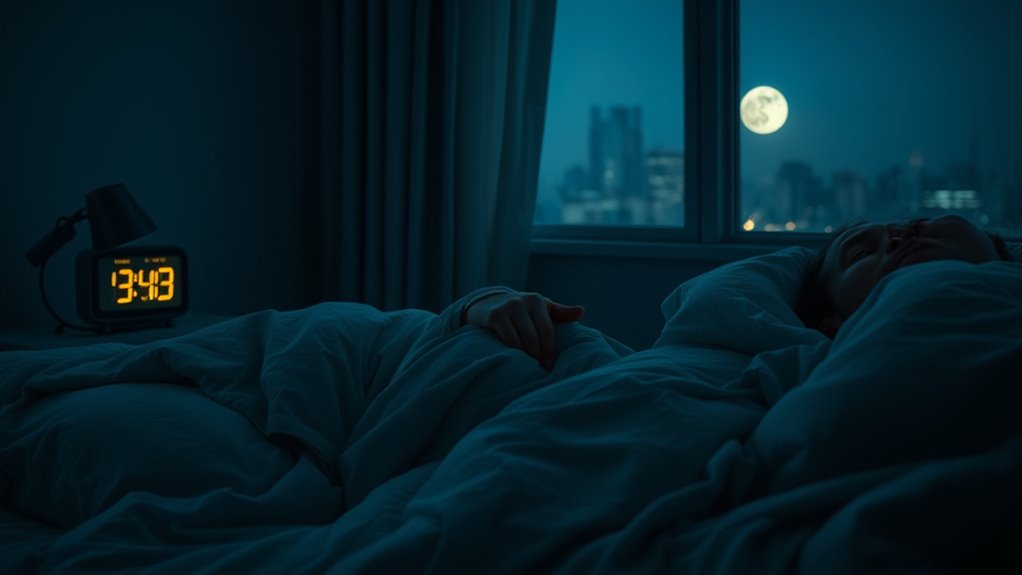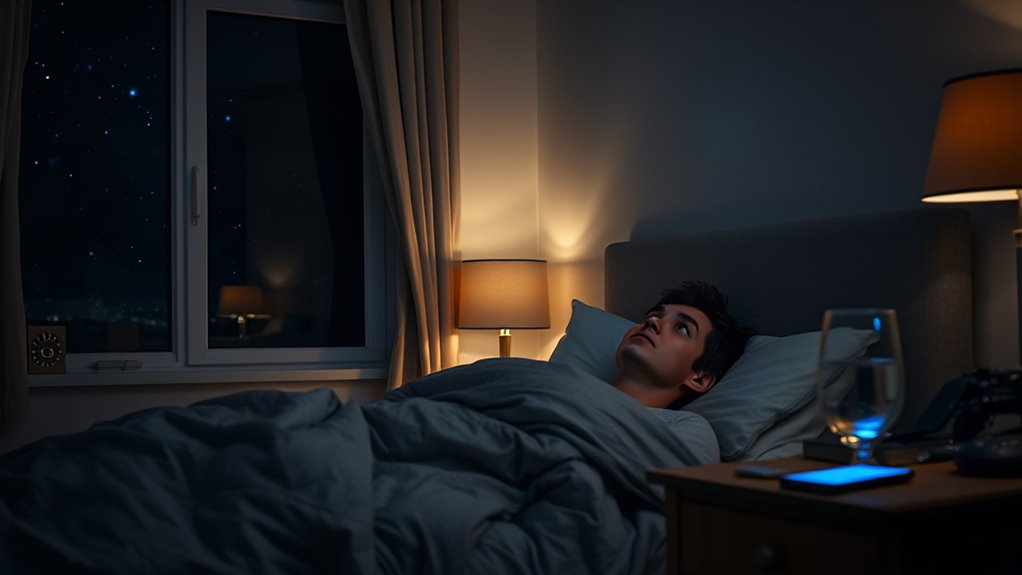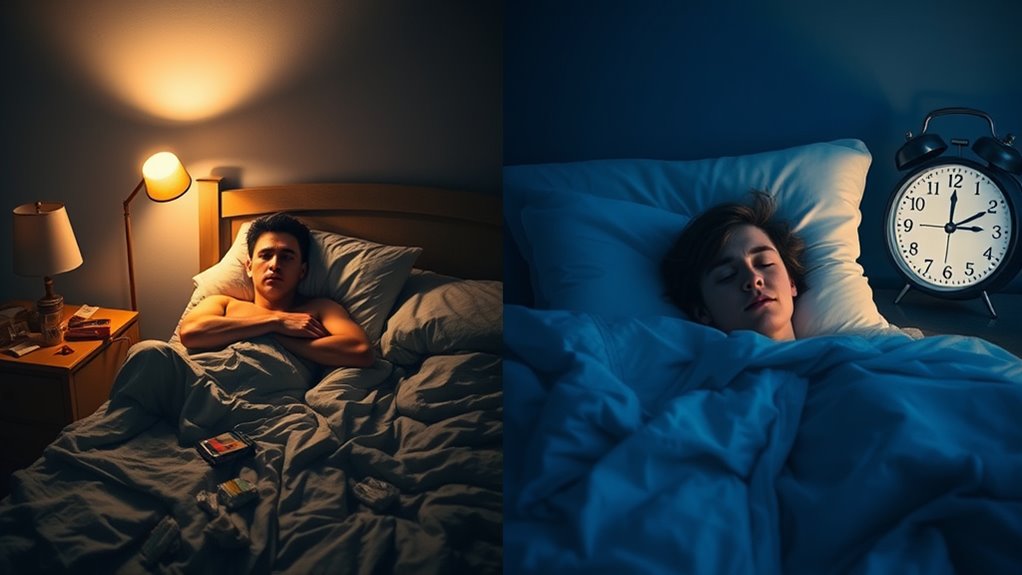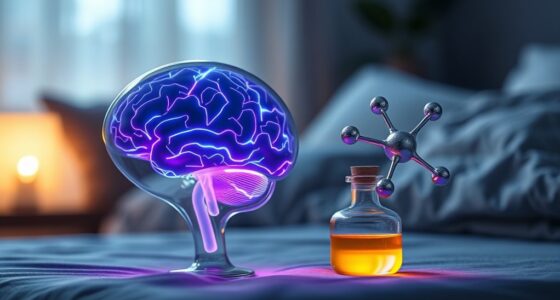Insomnia makes it hard for you to fall asleep or stay asleep, disrupting your sleep quality and cycle, while sleep deprivation occurs when you don’t get enough total sleep, regardless of cycle quality. Causes range from stress, anxiety, and poor habits to lifestyle choices and health issues. To improve, you can create a calming environment and stick to routines. Exploring these differences further reveals effective strategies to help you get restorative rest.
Key Takeaways
- Insomnia disrupts sleep quality and continuity, while sleep deprivation involves insufficient total sleep time regardless of sleep cycle.
- Causes of insomnia include stress, anxiety, poor sleep habits, and health conditions; sleep deprivation often results from lifestyle choices and demanding routines.
- Strategies for insomnia focus on improving sleep environment and hygiene; sleep deprivation requires increasing total sleep duration through behavioral changes.
- Recognizing whether sleep issues stem from difficulty falling/staying asleep or inadequate sleep duration guides targeted treatment.
- Addressing psychological and environmental factors, along with emerging AI solutions, can effectively manage both insomnia and sleep deprivation.
Understanding the Core Differences Between Insomnia and Sleep Deprivation

While both insomnia and sleep deprivation can leave you feeling exhausted, they are fundamentally different conditions. Insomnia disrupts your sleep cycle, making it hard to fall asleep or stay asleep, which directly impacts your rest quality. Even if you spend enough hours in bed, poor sleep continuity prevents you from reaching restorative sleep stages. Glycolic acid, known for its exfoliating properties, is unrelated to sleep issues but exemplifies how targeted treatments can improve skin health. Sleep deprivation, on the other hand, results from not getting enough sleep overall, whether due to external factors or intentional deprivation. In this case, your sleep cycle might be intact, but the total sleep time is insufficient. Understanding this distinction helps you recognize whether your issues stem from trouble initiating or maintaining sleep (insomnia) or from inadequate sleep duration (sleep deprivation). Both affect your rest quality, but their root causes differ markedly. Recognizing dream symbols related to stress or fatigue can also provide insights into underlying sleep issues. Additionally, the presence of sleep disorders like insomnia can sometimes be linked to underlying health conditions that affect your sleep architecture and overall sleep quality.
Common Causes and Risk Factors for Each Sleep Issue

Insomnia and sleep deprivation each have distinct causes and risk factors that can disrupt your sleep. For insomnia, lifestyle factors like stress, poor sleep habits, and inconsistent schedules often play a significant role. Anxiety and exposure to screens before bed can also contribute. Genetic predispositions may make you more susceptible to insomnia, affecting your brain’s ability to relax. Sleep deprivation, on the other hand, usually results from lifestyle choices such as irregular work hours, excessive caffeine, or demanding routines that cut into sleep time. Chronic sleep deprivation can also be influenced by underlying medical conditions or sleep disorders. While genetics may influence your overall sleep needs, environmental and behavioral factors are primary drivers for both issues, increasing your risk if unaddressed. Additionally, factors like flat iron bike technology and lifestyle trends can indirectly impact sleep patterns by encouraging more sedentary or irregular routines. Recognizing these risk factors can help you implement better sleep hygiene practices to improve overall sleep health. Moreover, issues like relationships or emotional stress can further complicate sleep quality, making it essential to address both physical and psychological influences for better rest. Engaging in relaxing activities and maintaining a consistent bedtime schedule can also significantly improve sleep quality and overall well-being.
Effective Strategies to Overcome Insomnia and Sleep Deprivation

Addressing the causes and risk factors of insomnia and sleep deprivation is the first step toward improving your sleep. To effectively combat these issues, focus on creating a calming sleep environment and practicing relaxation techniques. Establish a consistent sleep schedule, avoid screens before bed, and keep your room cool, dark, and quiet. Incorporate relaxation methods like deep breathing, meditation, or progressive muscle relaxation to ease your mind. Limit caffeine and alcohol intake, especially late in the day. Exercise regularly, but not right before bed. Using these strategies, you’ll promote better sleep quality and reduce insomnia and sleep deprivation symptoms. Small changes can make a significant difference in restoring restful, rejuvenating sleep. Recognizing the importance of sleep disorders can help you seek appropriate treatment if needed. Additionally, understanding AI’s role in healthcare can lead to innovative solutions for sleep-related conditions.
Frequently Asked Questions
Can Insomnia Lead to Long-Term Health Issues?
Insomnia can definitely lead to long-term health issues if it persists. Poor sleep quality affects your mental health, increasing risks of depression and anxiety. Over time, chronic insomnia can weaken your immune system, raise blood pressure, and even increase the risk of heart disease. If you don’t address it, these health problems may become more severe, so prioritizing good sleep habits is essential for maintaining overall well-being and mental health.
How Does Age Influence Sleep Deprivation Risks?
Imagine your sleep as a delicate clock, and with age, the gears start to slow down. As you grow older, age-related sleep changes make you more vulnerable to sleep deprivation risks, especially in the elderly. You might find it harder to stay asleep or feel rested. These elderly sleep risks increase because of natural shifts in sleep patterns, making it essential to prioritize good sleep habits at every age.
Are There Specific Medications That Worsen Insomnia?
Certain medications, especially some prescription sleep aids, can worsen insomnia due to their side effects. You might experience increased alertness or disrupted sleep patterns, making it harder to fall asleep or stay asleep. Other medications, like certain antidepressants or stimulants, can also interfere with your sleep quality. Always check the side effects of any medication and consult your doctor if you notice worsened insomnia or sleep issues.
What’s the Role of Diet in Managing Sleep Problems?
You can manage sleep problems by paying attention to your diet. Avoid dietary triggers like caffeine, alcohol, and heavy meals close to bedtime, as they disrupt sleep. Instead, incorporate sleep-promoting foods such as nuts, seeds, and cherries, which contain natural sleep aids like magnesium and melatonin. These dietary choices help stabilize your sleep cycle, making it easier to fall asleep and stay asleep throughout the night.
Can Exercise Help Differentiate Between Insomnia and Sleep Deprivation?
Exercise benefits your sleep quality by helping you determine if your sleep issues stem from insomnia or sleep deprivation. If regular physical activity improves your sleep, it likely points to sleep deprivation as the cause. However, if exercise doesn’t enhance your sleep, you might be dealing with insomnia. Paying attention to how exercise impacts your sleep can guide you toward effective solutions and better understand your sleep needs.
Conclusion
Understanding the difference between insomnia and sleep deprivation is your first step to reclaiming your nights. If you ignore these issues, you risk turning into a zombie, missing out on life’s vibrant moments. But with the right strategies, you can break free from this sleep nightmare. Don’t let restless nights turn you into a shadow of yourself—take action now, and wake up to a brighter, energized tomorrow!








